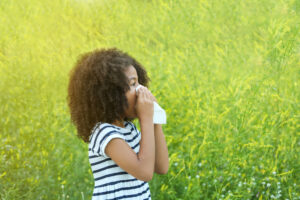April 14, 2022 | Black & Kletz Allergy

Most of these allergens are pollens, which are tiny microscopic grains that help in the fertilization of plants. These pollens are produced by trees, grasses, and weeds. Trees produce most of the pollen in the early Spring and grasses pollinate in the late Spring and early Summer in the Washington, DC, Northern Virginia, and Maryland geographical area. There is also a period in March and April when both trees and grasses release pollen. Ragweed is the most common weed and its pollen causes seasonal allergy symptoms in the Fall. Ragweed pollen usually begins to pollinate in mid-August in our region, peak in September and taper off after the first frost.
Types of Grasses:
The most common grasses that release pollen triggering allergy symptoms are as follows:
- Orchard
- Timothy
- Sweet Vernal
- Perennial Rye
- Bermuda
There are also other less common types of grasses that can cause seasonal allergies.
Symptoms:
- Itchy, runny, stuffy nose
- Itchy, watery, red, puffy eyes
- Itchy throat
- Itchy ears
- Sneezing
- Post-nasal drip
- Cough
Pollen can also affect the sinuses causing facial pressure and headaches. Some individuals also experience itching and skin rashes after exposure to the grass.
Many asthmatics are also sensitive to the grasses and can experience a flare-up of their symptoms which may include chest tightness, wheezing, coughing, and/or shortness of breath during the grass pollen season.
Diagnosis:
The diagnosis of grass allergies begins with a comprehensive history and physical examination. Skin tests and blood tests are 2 types of allergy tests that are used in order to confirm the diagnosis of grass allergy. Skin tests necessitate pricking of the intact skin with a sharp plastic lancet which has been dipped in a fluid containing the chemical extracts from different pollens with positive and negative controls. An individual sensitized to one or more grass pollens will show a raised itchy bump at the site of the skin test site of the corresponding pollen extract after 15 to 20 minutes. The other test is a laboratory test which analyzes the blood sample for the presence of specific antibodies. If someone exhibits the typical nasal and eye symptoms of grass allergies and tests positive for grass allergy, the condition is called allergic rhinitis (i.e., hay fever) and allergic conjunctivitis respectively. As mentioned previously, allergies to grass can also trigger asthma in certain individuals.
Treatment:
Avoidance:
After the diagnosis of grass allergy is confirmed, the first step in the management is to avoid exposure to the offending grass pollen to the best of one’s ability. Below are some recommended ways on how to avoid the pollen exposure:
- Stay indoors on high pollen days with the doors and windows closed
- Change clothes after outdoor activities
- Before going to bed, take a bath or shower and wash one’s hair to remove the pollen
- Lawns should be cut short, reducing the ability of the grasses to release pollen
- Wash bedding in hot water at least once a week
Medications:
- Oral antihistamines – To reduce sneezing, itching, and runny nose
- Nasal sprays – To help relieve nasal congestion and post-nasal drip
- Eye drops – To minimize itching, watering, and redness of the eyes
Desensitization:
Allergen immunotherapy (i.e., allergy shots, allergy injections, allergy desensitization, allergy hyposensitization) is a procedure offered by our allergy and immunology practice in order to build up tolerance to the pollens that an individual is sensitized to. This process is effective in minimizing the need for medications and preventing the allergy symptoms even after exposure to the pollen.
Allergen immunotherapy is over 100 years old in the U.S. and it is considered the standard of care when environmental controls and medications do not give adequate relief from symptoms or when medications cause undesirable side effects. This treatment modality is instrumental in improving the quality of life of allergy sufferers. It is effective in 80-85% of the individuals who take allergy shots and is usually a 3-5 year process.
The board certified allergy doctors at Black & Kletz Allergy have 3 convenient office locations in the Washington, DC, Northern Virginia, and Maryland metropolitan area and are very experienced in the diagnosis and treatment of grass allergies as well as other pollen and environmental allergies such as dust mites, molds, pets, and cockroaches. In addition, we also treat asthma, eczema, skin disorders (e.g., hives, generalized itching, swelling episodes, poison ivy, poison oak, poison sumac), food allergies, medication allergies, insect sting allergies, eosinophilic esophagitis, mast cell disorders, and immunologic disorders. Black & Kletz Allergy treat both adults and children and have offices in Washington, DC, McLean, VA (Tysons Corner, VA), and Manassas, VA. We offer on-site parking at each location and the Washington, DC and McLean, VA offices are Metro accessible. There is a free shuttle that runs between the McLean, VA office and the Spring Hill metro station on the silver line. Please call one of our offices to make an appointment or alternatively, you can click Request an Appointment and we will respond within 24 hours by the next business day. Black & Kletz Allergy has been serving the Washington, DC metropolitan area for more than 50 years and we pride ourselves in providing exceptional allergy and asthma care in a professional and pleasant setting.












